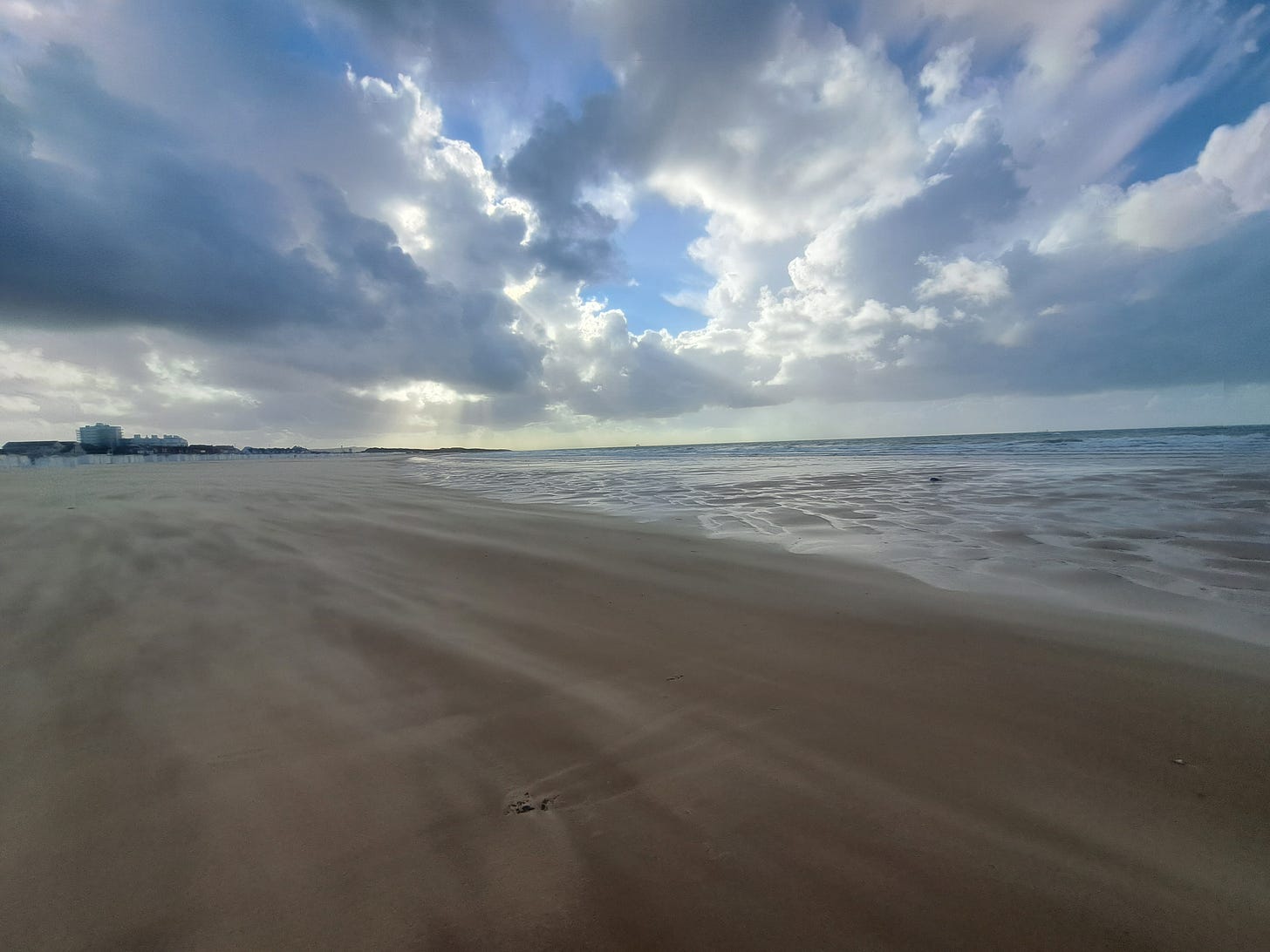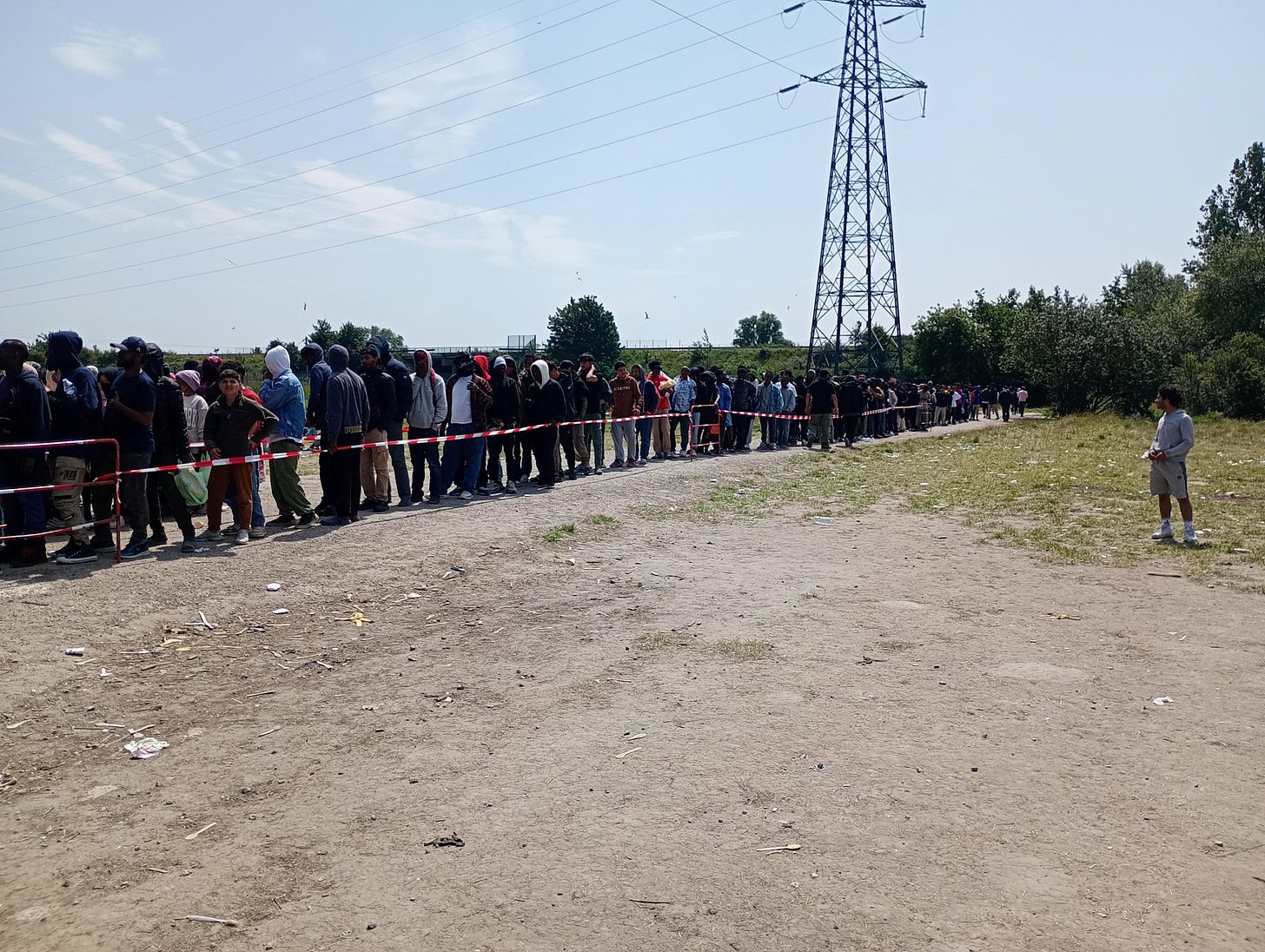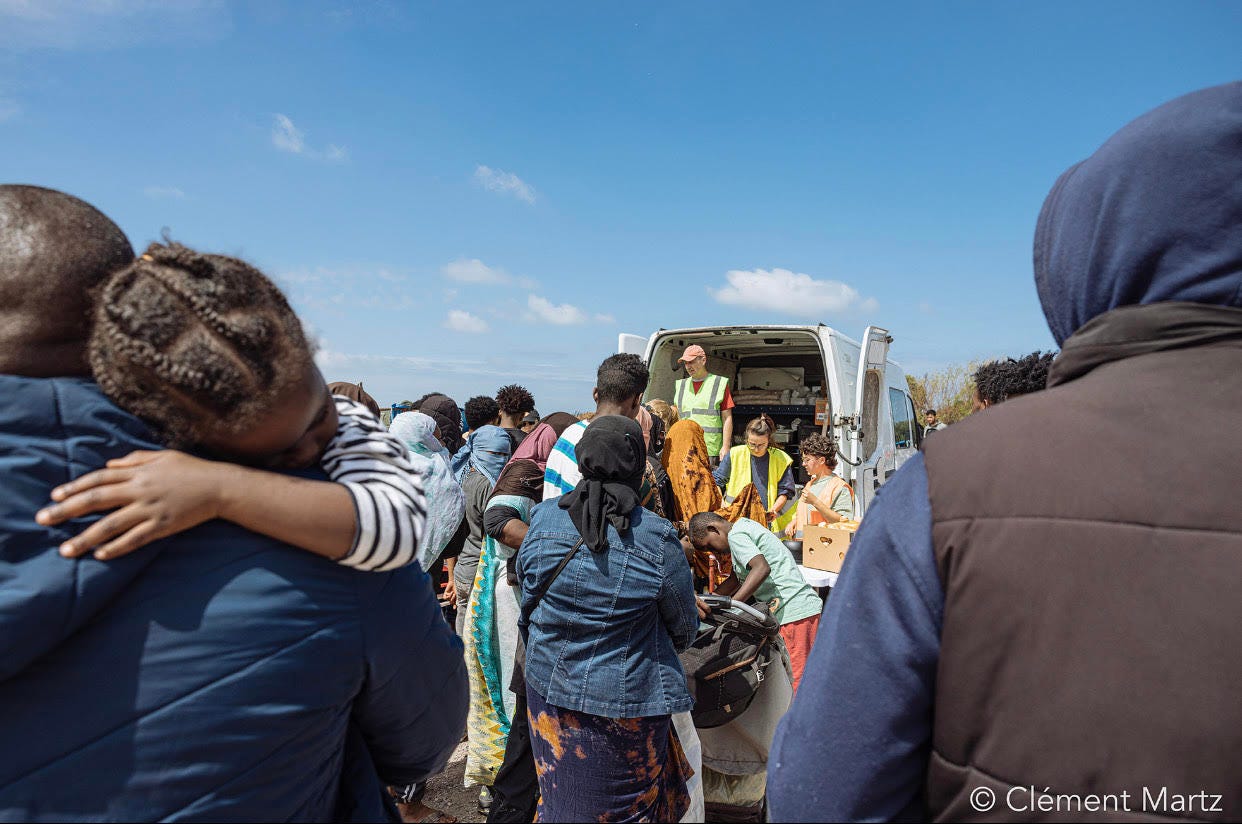Special report: hope, despair, and the deadly journey to Britain
Sarah Collins meets refugees waiting to cross the channel at Loon Plage in northern France
The day before I hear about the boat going down, I am standing in the sun in Dunkirk’s Loon Plage camp, where thousands of people seeking asylum wait to cross the English Channel.
I am with a charity that serves hot meals. As one man gets close to the front of the queue, he throws a few words in my direction. “Bonjour” he says, “I fell off the boat into the water last night”. He grabs his knees, miming falling to the ground, “the police came and then I fell off.” I am speechless at receiving this information with no context or build-up, and before I can respond, he has got his meal and gone to sit down with his friends.
The atmosphere at Loon Plage when I visit in early September is comparably relaxed, people are sitting in the sun eating with their families and friends. The mood is relaxed because there is enough food for everyone. The camp is half-empty, perhaps because so many people crossed the channel in the days before. More than 1,000 people arrived in the UK in a single day during September.
That was an exceptional day, but it forms part of a record year for people seeking asylum on small boats - more than 30,000 people had made the journey by the beginning of September this year. Many of those people will wait to cross at Loon Plage, a makeshift site that houses a fluctuating population of between one and two thousand people.
Life at Loon Plage is tough: there is no running water, no toilets, no permanent medical or welfare tents and people sleep in tents in the grass or bushes. Evictions happen fortnightly, when police come to slash the tents and try to move people on, which NGO workers say is in the hope that people will become so exhausted they give up.
“People are more worried about their boat being intercepted, so fewer boats are leaving,
and each carries more people”
In recent weeks, the first flights arrived in France as part of the new “one-in-one-out” returns deal agreed between Starmer and Macron in June, which means that the UK will grant refugee status to one asylum seeker with a connection to the UK, for every one person who crossed in a small boat that France agrees to take back. And while a plan to formally change French Maritime law to allow police officers to intercept boats with 300 metres of the shoreline hasn’t yet materialised, NGOs and media report that police are using more interventionist tactics on the beaches.
This, NGO workers tell me, has increased tensions and made departures more dangerous. “The number of police on the coast, not only in Calais and Dunkirk but also in the south has increased a lot since last year,” Aurelie*, an NGO worker in Dunkirk tells me. People are more worried about their boat being intercepted, so fewer boats are leaving, and each carries more people. Recently, she tells me, as many as a hundred people are boarding one boat. On the Saturday before I went to Loon Plage, 1097 people crossed in just 17 small boats, meaning an average of around 65 people travelled on each boat.
I do not get the sense that people I meet here are aware that they have become the centre of a political and media firestorm in the UK in recent months. Hossein* is smiling when he approaches me in Loon Plage, after he has finished his meal. He tells me has been living in the camp for 25 days and is frustrated that he hasn’t been able to cross yet. He doesn’t understand why so many people he has met in Loon Plage have made it to the UK, but he remains in the camp. He tells me that he tried to cross the night before but failed—he walked five hours to the beach and then had to walk five hours back to the camp, with no explanation from the smugglers.
Hossein’s story
Hossein had to leave Afghanistan when the Taliban gained control of the government. He had previously applied for asylum in Portugal and had been living there for two years, waiting for his residence permit to come through. He was told he would have his papers within six months, but two years later he was still languishing in legal limbo. He struggled with the Portuguese language: “They don’t give you any classes”, he says.
He looks at me bemused and asks me what I am doing in Loon Plage. “Do you come all the way to Dunkirk from England every day?” he asks. “No,” I say, and we laugh, “I’m staying here.” He asks me why I want to do this work, to talk to refugees. It’s a good question. “Because I get to meet interesting people,” I respond. There is a pause as two other young men walk over to us. He gestures to them, “I met them here, but they’ve become such a good friends.”
Before he walks away he says, “if they had given me my papers and residence in Portugal, I would not have to make this dangerous journey.” I leave the camp feeling upbeat and invigorated from my chats with people like Hossein. His hope for a better life is infectious.
The next morning, I am brought straight back to reality. I am in a meeting with another NGO when we are told the news that a boat went down the night before, in which three people died and another three are missing. My mind goes instantly to Hossein and to the many young children I have met in Loon Plage. Two out of the three dead are thought to be young people.
Aurelie tells me that she thinks Britain’s new border restrictive policies, and the rhetoric that surrounds them, do not discourage people from crossing the channel. Instead, she believes it may make people more panicked and determined to cross quickly. “The number of people who die has increased a lot,” Aurelie says—2024 was the deadliest year yet for channel crossings.
Departures from the beaches have become “more and more chaotic” because people are concerned about their boat being stopped by the police: “women and children are pushed onto the boats first, which increases the risk of asphyxiation.” Because of the panic sometimes families are separated, Aurelie says. On land, people in Loon Plage also face dangers— recently a man was found dead near a motorway exit near the camp, and another man, who is Sudanese, was critically injured after being hit by a truck.
I end the day in the park at a commemoration of those who died the night before. A long piece of laminated paper is rolled out amongst the group of people gathered, with the name of every person who has died crossing the channel. I think about Aurelie. Her organisation received a distress call from one of the boats where three people died. “If we had legal routes, we would not receive these distress calls,” she says, “and people would not die.” ■
About the author: Sarah Collins is assistant editor of Prospect magazine and a freelance journalist for The Week, The Guardian and many more publications.
*names have been changed to protect people’s identities





